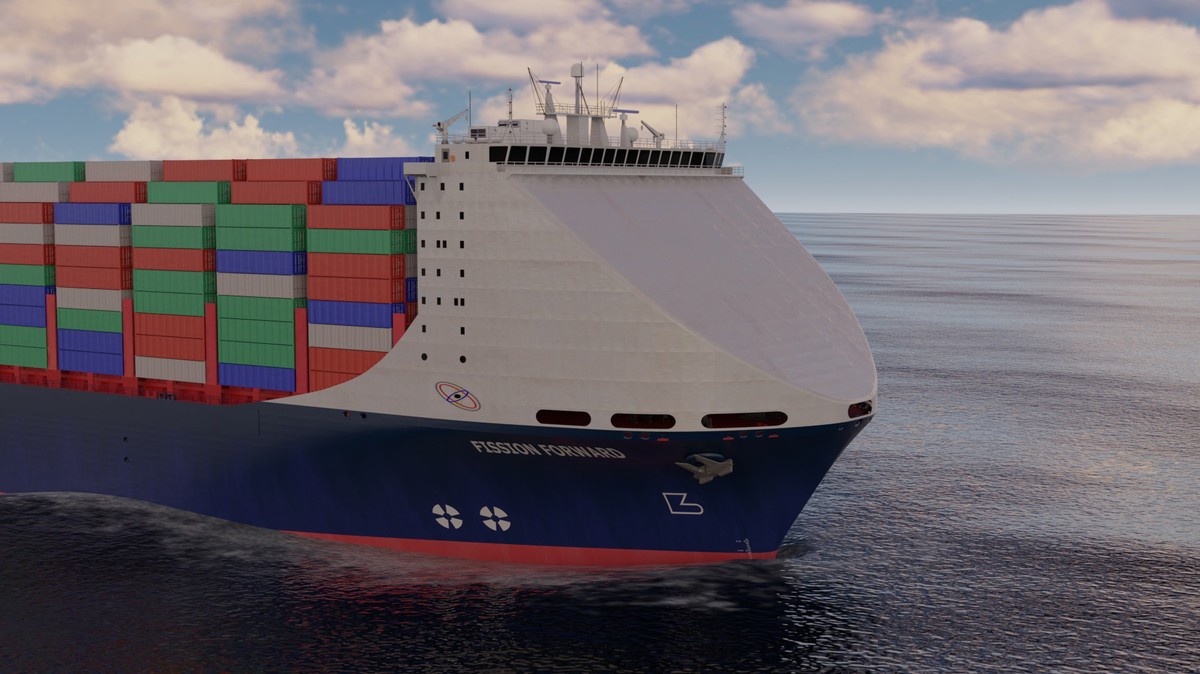Nuclear power as marine fuel could alter commercial bunker operations – LR
Nuclear-powered ships will require minimal onshore bunkering infrastructure and only some designated ports are expected to specialise in the maintenance of these ships, Lloyd’s Register (LR) said in a report.
 PHOTO: A concept design developed as part of ABS study on nuclear propulsion in commercial vessels. American Bureau of Shipping
PHOTO: A concept design developed as part of ABS study on nuclear propulsion in commercial vessels. American Bureau of Shipping
A “refuelling” operation in a nuclear-powered merchant ship could involve replacing uranium in the reactor, topping up the onboard reactor’s fuel or even replacing the entire reactor if it is a modular design, according to a report by classification society Lloyd’s Register.
The report does point out that it might take years before the ship really needs a reactor change or refueling.
“The high energy density of nuclear fuel creates the opportunity for reactors that will operate for multiple years before they need refuelling or replacing. Some designs may provide power for the entire lifespan of a ship,” it explains.
It also points out that nuclear-powered ships will require minimal onshore bunkering infrastructure.
“By removing the need for bunkering, nuclear-powered ships do not need to rely on the pipes, tanks, bunkering barges, cryogenic storage and other facilities in port that make up the bunkering infrastructure,” it adds.
Nuclear refueling will need to be carried out by nuclear specialists rather than regular bunkering crews. Some ports may become specialised centers for nuclear-powered ships, as refuelling these ships will be less frequent than traditional bunkering, according to LR.
Costs of nuclear bunkering
The upfront cost of fuelling a nuclear-powered ship will be higher than bunkering a ship with conventional marine fuels due to the high cost and regulatory constraints associated with uranium, LR said.
Uranium does not trade on an open market and can only be sold by licensed suppliers. Supplier operations are governed by the Treaty on the Non-Proliferation of Nuclear Weapons (NPT) and the International Atomic Energy Agency (IAEA). Uranium purchase contracts are negotiated privately between buyers and sellers, according to Canadian uranium supplier Cameco.
Cameco quoted the spot price for uranium at $84.25/pound of U3O8-equivalent (U3O8e) in June. U3O8, or triuranium octoxide, is a common uranium compound used as fuel in nuclear reactors. The long-term contract price was quoted at $79.50/pound of U3O8e in the same period, according to Cameco.
However, the LR report finds that using nuclear fuel might be more cost-effective compared to the cost of bunkering traditional fuels over the long-term because the operational life of a nuclear reactor is much longer.
The report suggests that shipowners and operators might manage nuclear fuel costs differently from regular fuels because of its high cost and regulatory constraints. Instead of purchasing fuel upfront, they might lease the reactor and treat the lease as a one-time capital expense rather than an ongoing operational expense.
Operational expenses refer to the day-to-day costs of running a business, while capital expenses cover the cost of acquiring physical assets.
By Konica Bhatt
Please get in touch with comments or additional info to news@engine.online






